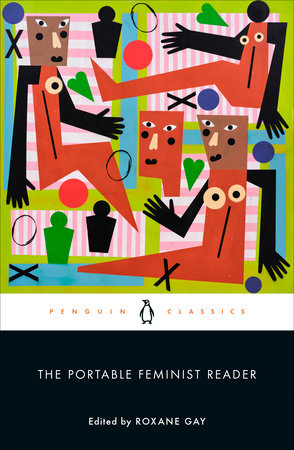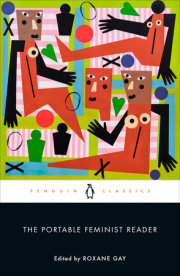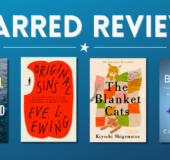Introduction by Roxane Gay
A Note on the Text
THE PORTABLE FEMINIST READER
Part I: Laying a Foundation
“Demarginalizing the Intersection of Race and Sex” by Kimberlé Crenshaw
“White Privilege: Unpacking the Invisible Knapsack” by Peggy McIntosh
"Derailing for Dummies" by Unknown
“No More Miss America” by Various
“Feminism Is So Last Week” by Jessica Valenti
“Women’s March Guiding Vision and Definition of Principles” by Various
Part II: Early Feminist Texts
“Declamation on the Nobility and Preeminence of the Female Sex” by Henricus Cornelius Agrippa
A Serious Proposal to the Ladies by Marie Astell
A Brief Summary, in Plain Language, of the Most Important Laws concerning Women; Together with a Few Observations Thereon by Barbara Leigh Smith Bodichon
“Are Women a Class?” by Lillie Devereux Blake
“The Yellow Wallpaper” by Charlotte Perkins Gilman
“The Higher Education of Women” by Anna Julia Cooper
“On Women’s Right to Vote” by Susan B. Anthony
“The Black and White of It" (from Southern Horrors: Lynch Law in All Its Phases) by Ida B. Wells
Part III: Multicultural Perspectives
“Under Western Eyes” by Chandra Talpade Mohanty
“Do Muslim Women Really Need Saving?: Anthropological Reflections on Cultural Relativism and Its Others” by Lila Abu-Lughod
“Why Do They Hate Us?” (from Headscarves and Hymens) by Mona Eltahawy
“La Guera” by Cherríe Moraga
“La Prieta” by Gloria E. Anzaldúa
“Growing Up as a Brown Girl: My Chonga Manifesto” by Prisca Dorcas Mojica Rodríguez
“I Am Woman” by Lee Maracle
“Sovereignty of the Soul: Exploring the Intersection of Rape Law Reform and Federal Indian Law” by Sarah Deer
Part IV: Feminist Labors
“The Laugh of the Medusa” by Hélène Cixous
“The Politics of Housework” by Pat Mainardi
“I Want a Wife” by Judy (Syfers) Brady
“Women and the Myth of Consumerism” by Ellen Willis
“A Question of Class” by Dorothy Allison
“The Advantages of Being a Woman Artist” by the Guerrilla Girls
“Men Explain Things to Me” by Rebecca Solnit
Part V: Gender Considerations
“A Cyborg Manifesto: Science, Technology, and Socialist-Feminism in the Late Twentieth Century” by Donna J. Haraway
“The Woman-Identified Woman” by Radicalesbians
“Women Like Me” by Wendy Rose
“We Are All Works in Progress” by Leslie Feinberg
“Girl” by Alexander Chee
Gender Outlaw by Kate Bornstein
“Being Female” by Eileen Myles
“Volcano Dreams” by Gabrielle Bellot
Part VI: Black Feminism(s)
“The Combahee River Collective Statement” by Various
“Race, Gender, and the Prison Industrial Complex” by Angela Y. Davis and Cassandra Shaylor
“The Uses of Anger” by Audre Lorde
“Holding My Sister’s Hand” by bell hooks
“In the Name of Beauty” by Tressie McMillan Cottom
“The Problem with Sass” by Brittney Cooper
“The Meaning of Serena Williams” by Claudia Rankine
“Black Girls Don’t Get to Be Depressed” by Samantha Irby
Part VII: Sexual Politics
“Manifesto of the 343 Sluts” by Simone de Beauvoir
“Thinking Sex: Notes for a Radical Theory of the Politics of Sexuality” by Gayle S. Rubin
“The Sexual Geopolitics of Popular Culture and Transnational Black Feminism” by Janell Hobson
“Rape Joke” by Patricia Lockwood
“If Men Could Menstruate” by Gloria Steinem
“Assume the Position” by Patricia Hill Collins
“Hooters Chicken” by Lizz Huerta
“I Used to Give Men Mercy” by Terese Mailhot
“Happy Hookers” by Melissa Gira Grant
“Your Ass or Mine” by Virginie Despentes
“To the Man Who Shouted ‘I Like Pork Fried Rice’ at Me on the Street” by Franny Choi
Part VIII: Feminist Praxis
“Ecofeminism: Toward Global Justice and Planetary Health” by Greta Gaard and Lori Gruen
“Gendered Geographies and Narrative Markings” by Mishuana Goeman
“Slow” by Susan Stinson
“Feminism and Disability” by Jenny Morris
“Toward a Feminist Theory of Disability” by Susan Wendell
“Sick Woman Theory” by Johanna Hedva
“Making Space Accessible Is an Act of Love for Our Communities” by Leah Lakshmi Piepzna- Samarasinha
Part IX: Looking Back, Looking Ahead
“Sisterhood Is Powerful” by Susan Brownmiller
“Killing Joy: Feminism and the History of Happiness” by Sara Ahmed
Acknowledgments
Suggestions for Further Reading/Watching/Seeing/Listening
Credits




